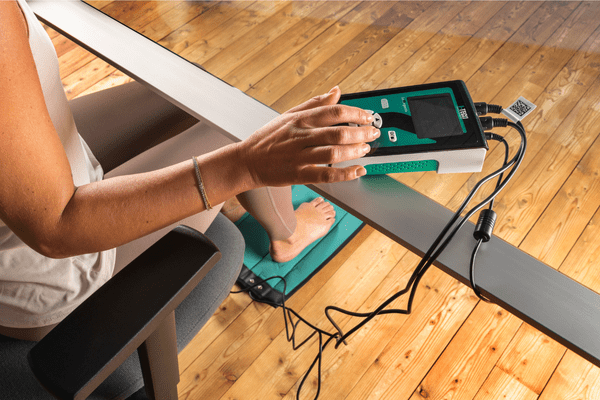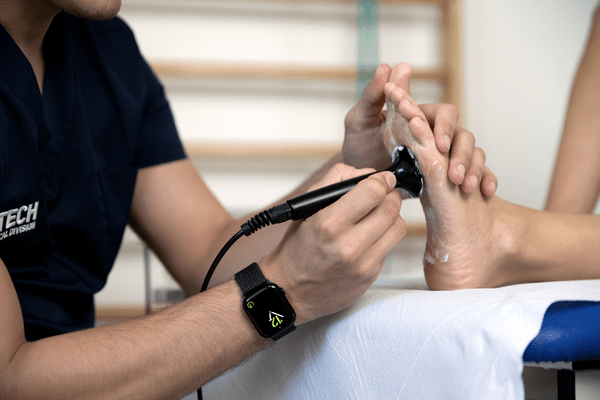Plantar fasciitis is a painful condition affecting the heel and sole of the foot, caused by inflammation of the plantar fascia, a ligament that runs along the bottom of the foot. This disorder is particularly common among athletes, overweight people and those who spend many hours on their feet. Recognising the symptoms and intervening early with appropriate remedies is crucial to reduce pain and promote healing. Among the most effective therapies are those offered by I-Tech Medical Division devices such as PEMF therapy, tecar therapy, ultrasound therapy and electrostimulation.
What is plantar fasciitis?
Plantar fasciitis is a condition that causes pain and inflammation in the arcuate ligament, which extends along the bottom of the foot, connecting the heel to the base of the toes [1]. Risk factors that trigger this condition include limited ankle dorsiflexion, increased body mass index and standing for prolonged periods [2].
In fact, this condition mainly affects runners, athletes and people who work long hours on their feet, but it can also occur in those who use unsuitable shoes or have poor posture.
Symptoms of plantar fasciitis
Understanding the symptoms of plantar fasciitis is essential to intervene early and prevent the condition from worsening. The pain caused by this inflammation can significantly affect mobility and quality of daily life. Symptoms can range from mild discomfort to intense pain that limits daily activities, making it difficult to walk or stand for long periods. Recognising the initial signs allows the right countermeasures to be taken immediately to avoid long-term complications. The main symptoms of plantar fasciitis include:
- Heel pain: The pain is most intense in the morning and worsens at the end of the day [2].
- Foot stiffness: After periods of inactivity, the foot may be stiff and painful.
- Pain during activity: Walking, running or standing for long periods can worsen pain.
- Burning sensation or tension: Some people report a feeling of tension in the sole of the foot or slight swelling.

Causes of plantar fasciitis
Plantar fasciitis can result from multiple factors, which often combine to aggravate inflammation and pain. This condition is generally linked to excessive stress on the plantar fascia, due to repeated strain or predisposing conditions. The causes may be biomechanical in nature, related to posture or foot conformation problems, or result from incorrect lifestyle habits, such as wearing inappropriate footwear. Identifying the specific cause of one’s plantar fasciitis is the first step towards targeted and effective treatment. The main causes of this condition include:
- Mechanical overload: Intense physical activity or repetitive movements can stress the plantar fascia.
- Obesity: Excessive body weight increases pressure on the foot, promoting inflammation.
- Inadequate footwear: Shoes without adequate arch support can contribute to the development of fasciitis.
- Flatfoot or hollowfoot: Alterations in the conformation of the foot can increase the risk of developing plantar fasciitis.
Remedies for plantar fasciitis
There are several approaches to treat plantar fasciitis, but they must always be prescribed by your doctor. The main ones include:
- Rest and ice: Reducing physical activity and applying ice to the painful area can help decrease inflammation [2].
- Stretching exercises: Stretching the plantar fascia and calf muscles helps reduce tension and pain [2].
- Non-steroidal anti-inflammatory drugs: these must be prescribed by your doctor after consultation.
- Physical instrumental therapies: Technologies such as PEMF therapy and tecar therapy can accelerate recovery and relieve pain.
I-Tech therapies for plantar fasciitis
I-Tech Medical Division devices offer advanced solutions for the treatment of plantar fasciitis, allowing for effective therapies even at home.
PEMF therapy for plantar fasciitis
PEMF therapy uses magnetic fields to stimulate tissue regeneration and reduce inflammation. I-Tech Medical Division devices are designed for safe and targeted treatment with proven results.
Discover all the options available for the treatment of plantar fasciitis with the different PEMF therapy products from I-Tech Medical Division.

Tecar therapy for plantar fasciitis
Tecar therapy promotes vasodilation and cell metabolism, accelerating the healing process. Thanks to I-Tech Medical Division devices designed for professional use in the practice, patients can receive customised treatments using safe and effective devices.

Ultrasound therapy for plantar fasciitis
Ultrasound generates mechanical vibrations that stimulate the inflamed tissue, improving circulation and reducing pain. However, this therapy should only be carried out if you are not in an acute, subacute state of pain. Always consult your doctor.
Plantar fasciitis is a condition that can impair quality of life, but with the right remedies, it is possible to alleviate the pain and promote healing. It is important to intervene early, adopting targeted strategies to reduce inflammation and improve foot function. From cold therapy to stretching exercises to the use of advanced medical devices, there are many options available that can be customised to each patient’s needs.
I-Tech Medical Division‘s advanced therapies provide an innovative and affordable solution for the treatment of plantar fasciitis in the comfort of your own home. Thanks to PEMF therapy, tecar therapy and ultrasound technology, it is possible to accelerate recovery and achieve effective and lasting relief. Relying on quality instruments allows you to address plantar fasciitis safely and professionally, without having to resort to invasive or pharmacological solutions. Restoring foot health is essential to improve mobility and return to everyday activities with greater ease and comfort. Plantar fasciitis is a condition that can compromise quality of life, but with the right remedies it is possible to alleviate pain and promote healing.
Bibliography:
[1] IRCCS HUMANITAS. Fascite plantare. Consultato il 4 aprile 2024. https://www.humanitas.it/malattie/fascite-plantare/
[2] Trojian T, Tucker AK. Plantar Fasciitis. Am Fam Physician. 2019 Jun 15;99(12):744-750. PMID: 31194492. https://www.aafp.org/pubs/afp/issues/2019/0615/p744.html





